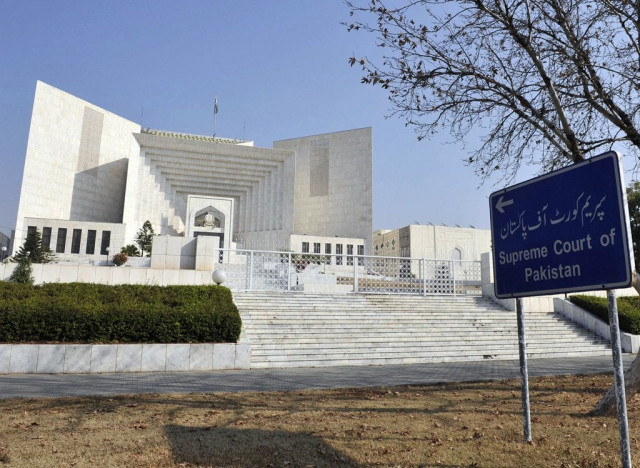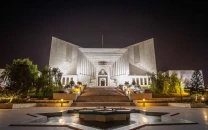Govt directed to amend NAB’s voluntary return law
Top court gives govt three months to legislate

The Supreme Court of Pakistan. PHOTO: AFP
A three-judge bench of the Supreme Court — headed by Chief Justice Gulzar Ahmed — issued the direction while hearing a matter related to the interpretation of Section 25 (a) of the National Accountability Ordinance (NAO), 1999.
Section 25 (a), ‘Voluntary return – plea bargain’, “Notwithstanding anything contained in Section 15 or in any other law for the time being in force, where a holder of public office or any other person, prior to the authorisation of investigation against him, voluntarily comes forward and offers to return the assets or gains acquired or made by him in the course, or as the consequence, of any offence under this ordinance, the chairman NAB may accept such offer and after determination of the amount due from such person and its deposit with the NAB discharge such person from all his liability in respect of the matter or transaction in issue provided that the matter is not sub judice in any court of law.”
Chief Justice Gulzar clarified that the matter would be decided according to the law and merit if the government failed to legislate within three months. “If the Supreme Court strikes down any provision of the NAO, then the entire law would be rendered ineffective,” he said.
The top judge also expressed serious concern over “decades-long” delays in NAB cases. He criticised NAB’s “slow” working procedure which involves inquiry, investigation and testimony of witnesses.
Chief Justice Gulzar said the apex court expected parliament to pass effective legislation as the matter has been pending since 2016. “Cases of beneficiaries also remain undecided due to pendency of this issue,” he added.
Earlier, Senator Farooq H Naek apprised the bench that a Senate committee was vetting a private member’s bill tabled by him regarding the NAO. “Once the committee gives the nod of approval, the bill will be tabled in parliament,” he said. “The bill proposes omission of the voluntary return clause.”
Meanwhile, Additional Attorney General Amir Rehman told the bench that Attorney General Anwar Mansoor Khan did not support omission of Clause 25 (a).
He, however, said the government supported Naek’s bill seeking amendments in the NAO.
Suo motu notice
In 2016, then top court judge, Amir Hani Muslim, while hearing a NAB appeal against the rejection of remand of an accused in a fraud case, had referred the matter to then chief justice, Anwar Zaheer Jamali, to form a larger bench to examine the voluntary return clause.
In his order, Justice Muslim noted that the frequent exercise of voluntary return clause by NAB increased corruption, as well as defeated the purpose of the NAO, which was promulgated to eliminate financial corruption.
He observed that a civil servant, after striking a deal under Section 25 (a), returned to his office and resumed his illegal practices. Neither the federal nor provincial government took notice of such matters, despite receiving NAB letters regarding such civil servants, he added.
Justice Muslim said that exercise of Section 25 (a) by NAB under the voluntary return scheme was prima facie a conflict of various provisions of the Constitution, and such power could only be exercised by a judicial forum, as after the payment, the accused goes scot-free without any proceedings.
The court said such aspect should be examined in the light of the Constitution wherein a civil servant could not be allowed to take benefit of the clause.
Hence, the NAB chairman was also restrained to exercise this power.
Later, a three-judge apex court bench, headed by then chief justice Jamali, while taking suo motu notice of the matter in Oct 2016, directed the Establishment Division secretary and the provincial chief secretaries to ensure initiation of departmental proceedings forthwith against the employees who had availed the voluntary return facility.
NAB report
In Sept, 2016, the anti-corruption watchdog informed the Supreme Court that as many as 1,584 civil servants had benefited from the voluntary return scheme, depositing Rs2,022 million.
Of these, 165 were federal bureaucrats, and 1,419 were in the service of provincial governments.
According to the breakup, 33 public servants –23 federal and 10 provincial – had availed the facility in Lahore. Six civil servants – one federal and five provincial – had struck a similar deal with NAB Multan.
Seventy-four public servants – 70 federal and four provincial – had reached agreements with NAB Rawalpindi; 374 – six federal, 368 provincial – with NAB Karachi; 62 –12 federal and 50 provincial – with NAB Balochistan; 92, all provincial, in Sukkur as well as 943 – 53 federal, 890 provincial – in Khyber-Pakhtunkhwa.



















COMMENTS
Comments are moderated and generally will be posted if they are on-topic and not abusive.
For more information, please see our Comments FAQ